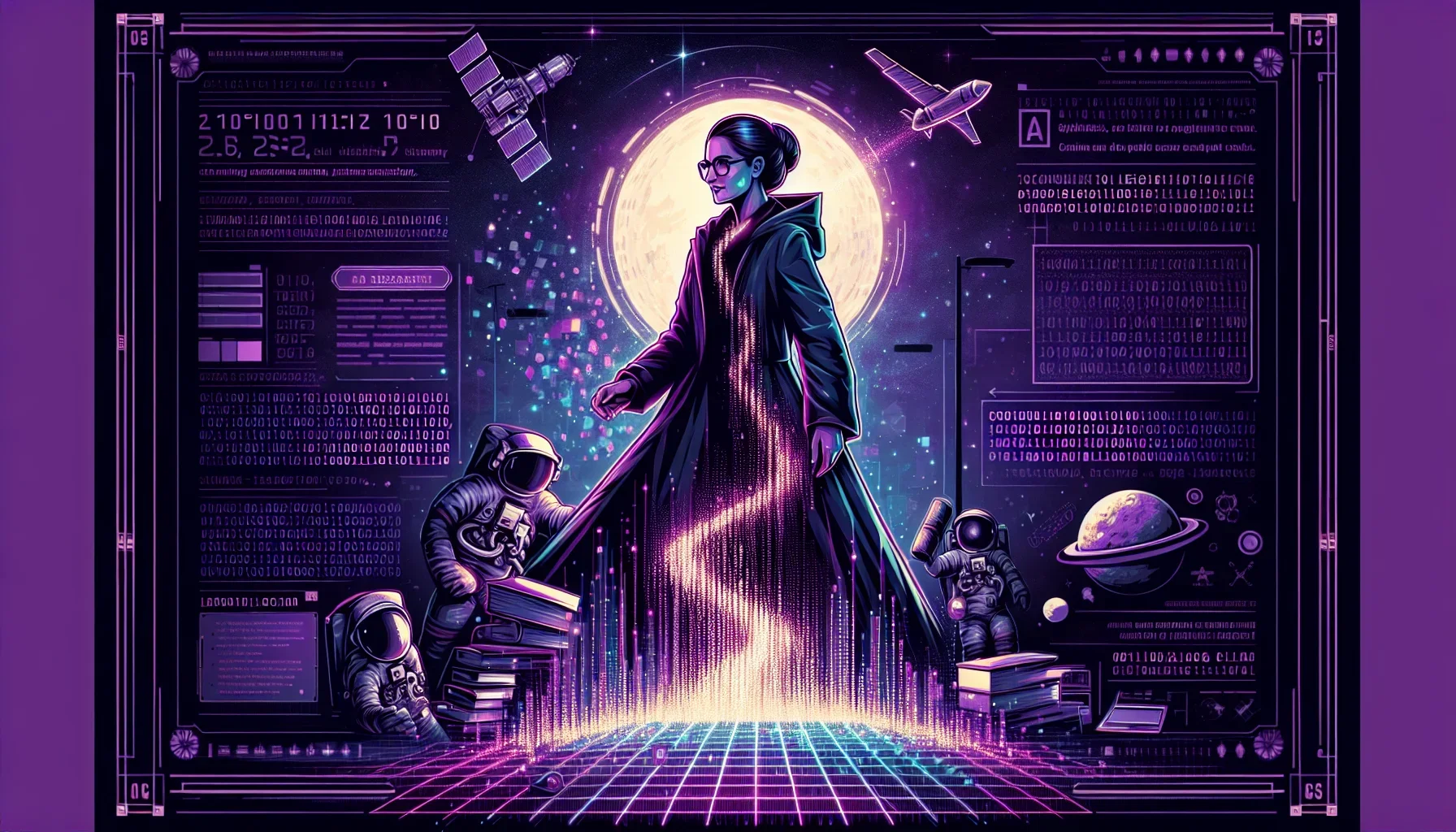
The Enduring Legacy of Karen Spärck Jones in Computer Science
- Exploring the Legacy of Karen Spärck Jones
- Embarking on the Journey
- Pivotal Moment: Embracing Computational Linguistics
- The Legacy of Karen Spärck Jones in Information Retrieval
- Remarkable Milestones and Honors
- Influence on Modern Search Engines
- The Lasting Impact of Karen Spärck Jones in Tech History
- Final Thoughts: Honoring a Legend in Computer Science
Exploring the Legacy of Karen Spärck Jones
When it comes to the universe of computer science, Karen Spärck Jones is a star that outshines many. A native of Huddersfield, Yorkshire, this trailblazer devoted her life to the realm of computational linguistics, leaving an indelible mark on the digital landscape we navigate today. As we dive into the intricacies of search engines and the art of information retrieval, it would be a glaring omission not to acknowledge her pivotal role.
Her Impact on Search Engines
She laid the groundwork for these systems, and her influence is felt in everything from Google's complex algorithms to Siri's voice recognition capabilities. But her narrative extends beyond her impressive scientific triumphs. It provides a rare lens into the challenges and victories of a woman in a field often skewed towards men.
Groundwork for search engine systems
Influence on Google's complex algorithms
Contribution to Siri's voice recognition capabilities
Beyond Her Scientific Triumphs
Without her invaluable input, our perception and interaction with computer science would undoubtedly be radically different. So, as we embark on this digital odyssey, let's zoom in on the life and contributions of this exceptional figure in computer science.
Embarking on the Journey
Imagine a young girl, born in the heart of Yorkshire, England, on a sunny day of August 26, 1935. Her name is Karen Spärck Jones, and she's about to embark on an incredible journey. From her early days, she was intrigued by the complexities of language, a fascination that only deepened over time. This interest was cultivated at Girton College, Cambridge, originally with a focus on history. But soon, her intellectual compass pointed her towards philosophy, and she ended up bagging a degree in it.
But Karen's thirst for knowledge didn't stop there. She ventured into the emerging field of computational linguistics, marking the initiation of her awe-inspiring exploration of the interconnection between language and computers. Drawing inspiration from the wise words of the renowned coder Confucius, "Choose a job you love, and you will never have to work a day in your life," Karen found her true passion at the crossroads of language and technology. And that, fellow IT enthusiasts, is how our heroine set foot into the realm of computers and language, making history in the process.
Pivotal Moment: Embracing Computational Linguistics
Post graduation, Karen Spärck Jones embarked on a new path by joining the Cambridge Language Research Unit in 1957, a pivotal moment that signified the beginning of her adventures in computational linguistics. Despite its modest size, the unit was a dynamic hotbed of innovation, leading the way in machine translation and natural language processing. Here, Jones found herself at the exciting intersection of her passion for language and a blossoming curiosity in computer science.
Enthralled by the prospect of leveraging computers to decode and interpret human language, she dove headfirst into research on how to teach machines to replicate the subtleties of human interaction. As the saying goes, "every long journey starts with a single step." For Jones, this was the leap into the unknown.
Unbeknownst to her at the time, her explorations would pave the way for revolutionary advancements in information retrieval and search engines, effectively reshaping the landscape of our digital history.

The Legacy of Karen Spärck Jones in Information Retrieval
When it comes to revolutionizing the realm of information retrieval, Karen Spärck Jones is a name that stands tall. She is widely hailed for her groundbreaking introduction of the inverse document frequency (IDF), an influential weighting mechanism in information retrieval that gauges the significance of a term within a document or a collection. This ingenious concept is a pivotal component that fuels the prowess of contemporary search engines. Picture IDF as the clandestine ingredient that supercharges Google's search wizardry. In the immortal words of our beloved web-slinger, Spiderman, "With great power comes great responsibility." Undoubtedly, it was Spärck Jones' IDF that endowed search engines with the remarkable ability to comprehend and serve up content in line with user queries. Yet, her contribution to the tech world extends beyond this. She also made notable strides in the field of natural language processing, thereby playing a crucial role in the evolution of voice recognition technologies such as Siri and Alexa. Consequently, every time you type in a search request or seek a weather update from your smart speaker, you're reaping the benefits of the trailblazing work of this phenomenal computer scientist.
Remarkable Milestones and Honors
Throughout her glittering professional journey, Karen Spärck Jones has chalked up a plethora of impressive feats and has been honored with a multitude of esteemed awards. One such remarkable milestone was her appointment as the president of the Association for Computational Linguistics in 1994, a clear recognition of her invaluable and influential contributions to the domain.
In 2002, Spärck Jones was bestowed with the Lovelace Medal, the ultimate recognition in UK computing, conferred by the British Computer Society. She was also the proud recipient of the distinguished Association for Computing Machinery's (ACM) Salton Award in 1988, a tribute that acknowledges significant, sustained, and influential contributions to the realm of information retrieval.
In 2007, she was graced with the Lifetime Achievement Award from the Special Interest Group on Information Retrieval (SIGIR) of ACM. To quote the age-old coding adage, "A good coder's worth is not judged by the lines of code they pen, but by the impact they create." Karen Spärck Jones' impact on computational linguistics and information retrieval is not merely significant—it's colossal and her legacy continues to inspire and propel the field even today.
Influence on Modern Search Engines
The revolutionary work of Karen Spärck Jones has left an indelible mark on the landscape of contemporary search engines. Her introduction of the inverse document frequency (IDF) concept essentially set the groundwork for the operations of today's search platforms. Picture search engines as an orchestra, with IDF as the maestro, orchestrating the algorithmic ensemble to comprehend and translate user inquiries, subsequently providing the most pertinent results. In the absence of IDF, pinpointing specific information on the web would be analogous to locating a minuscule needle in a gigantic haystack, a daunting endeavor considering the colossal volume of data available online.
Spärck Jones' contributions have also played a significant role in shaping the voice recognition and response systems found in virtual assistants like Siri and Alexa. Echoing the tech equivalent of Newton's third law, "Every user query generates an equally relevant search outcome." This is largely attributable to Spärck Jones' trailblazing efforts. Whether it's punching a question into Google or requesting Alexa to play your go-to tune, the reverberations of her innovations are evident in every interaction we share with the digital realm.
The Lasting Impact of Karen Spärck Jones in Tech History
There's no denying that Karen Spärck Jones has etched a profound influence on the annals of scientific evolution, particularly in the realms of computational linguistics and information retrieval. She was a pathfinder, not merely because she was a rare female presence in a field dominated by men, but owing to her unparalleled knack for visualizing and crafting technologies that have revolutionarily transformed our digital landscape.
She was more than your average computer scientist—she was a visionary who dared to tread uncharted territories. Echoing a renowned Star Trek quote, she audaciously embarked on journeys no computer scientist had ever dared before. Her ground-breaking contributions have laid the bedrock for a myriad of our present-day digital systems and continue to ignite the spirit of exploration in many.
- Ground-breaking contributions
- Ignites spirit of exploration
Yet, her legacy is more than just her scientific discoveries. She fiercely championed for the inclusion of women in tech, thus paving the path for future generations of women to leave their indelible mark in the field. So, when we flip through the pages of tech history, Karen Spärck Jones stands tall as a beacon of light who employed her expertise, acumen, and enthusiasm to push the envelope of possibilities and bring about a positive change in the world.

Final Thoughts: Honoring a Legend in Computer Science
While reflecting on the remarkable life of Karen Spärck Jones, we pay tribute to a trailblazing computer scientist whose innovations have radically transformed our relationship with technology. Her pioneering work in the realms of computational linguistics and information retrieval has played a crucial role in sculpting the search engines we rely on today. A Yorkshire native and Cambridge College alumna, Spärck Jones shattered glass ceilings and emerged as a colossus in a field traditionally male-dominated. She was the Neil Armstrong of our tech cosmos, launching groundbreaking strides for humanity, equipping us with the means to effortlessly traverse the digital expanse. Her revolutionary work, celebrated with numerous accolades, continues to fuel scientific progress today.
Recalling Spärck Jones, an adage popular in coding circles springs to mind: "In the programming sphere, there are those who tread established trails and those who blaze new ones. Karen Spärck Jones was undeniably a trailblazer." As we forge ahead, let's commit to honoring her indelible legacy by carving out our own trails and fostering a more inclusive tech landscape.







